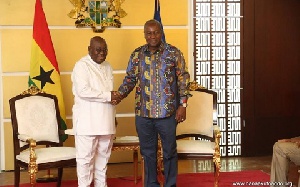 President Akufo-Addo with Former President John Mahama
President Akufo-Addo with Former President John Mahama
Nowadays in Ghanaian body politic, it is not unusual to hear people from all walks of life or from diverse ideological backgrounds, including the NDC’s propaganda outpost, talking passionately even against making simple comparisons.
We often hear a large number of Ghanaians cheer-led by the main opposition party reminding us that “ex-President Mahama is no longer in power so don’t compare his past government to the current NPP regime.” In other words, the NDC’s propaganda/communication team, especially, pushes a suspicious storyline that there is no need to compare ex-President Mahama’s performance to President Akufo-Addo with his ruling NPP in charge of the nation’s economy.
In short, anyone following the back and forth debates on the true state of the country’s economy handed down to Nana Addo-led government, most likely would be led into a universe where the popular belief seems to be that any form of comparison, notably in terms of past and present governments is considered a taboo—a no-go area! This narrow-mindedness retards analytic thoughts, leading one to raise relevant question as to what point in human condition makes comparing at least two things, whether alike or not, unthinkable?
Before moving any further let’s educate or refresh our memories about the crucial role comparison plays in every human endeavor or existence.
Honestly, millions of brothers and sisters in our motherland are stubbornly difficult to figure them out; for it is not easy trying to understand the clear pathways of their thought processes on a number of pressing issues.
Even many people supposed to be well educated are often guilty of this confused line of thinking that comparisons are somewhat unfair or needless.
Think carefully about this: How in the world can any human being functions effectively or makes sense of his or her surroundings as well as interacting with other people on daily basis without comparisons? The chances are as you’re reading through this column, at the same time you’re most likely debating within yourself or with some other friends about which of the “chop bars” or grocery stores in town has prices that are relatively affordable. Without making associations among human events, or more importantly, compare (say) the prices of different food items on the market or airline tickets, wouldn’t it be hard to find or know reasonable food prices or airfares for a potential air traveler?
The act of comparing humanizes our everyday existence and it helps us organizes and provides structure, clarity to our thinking process in the most logical fashion possible. Comparisons form intrinsic part of who we are as humans. This means any sane person who trivializes the significance of comparison is also downplaying his or her own humanity. After all when someone says he or she is thinking, in effect that individual’s brain is simultaneously generating ideas and judging those ideas all based on comparing what the person is seeing or remembering.
Over the recent years, countless scientific studies by cognitive psychologists and other experts have given us some good insights that human thinking basically has two stages: Creative/production stage and judgment/critique phase. Keep in mind all these thinking processes within our brains occur quickly, either consciously or on subconscious level and enabled by constant comparisons.
In simple terms, whenever one is faced with two or more possible courses of action in everyday life and the person weighs the choices and finally decides to choose between or among the available options, clearly one is able to make those choices because of human ability to compare things. Who among us has not made any comparison, whether intentionally or unintentionally today? Fact is, human thinking thrives on comparing events, circumstances, experiences, both past and present to help us understand the world we live in, and also to try to avoid repeating mistakes and improve upon our performances as well.
Particularly, if all Ghanaians were to listen to the outpourings of NDC ‘communication team’ today, the impression will be that comparing Nana Akufo-Addo’s government to the past Mahama administration is a taboo.
Actually, it looks like the main opposition propaganda squad has almost succeeded in shutting down discussions about making comparisons between the current Nana Akufo-Addo administration and the lackluster management of Ghanaian economy under ex-President Mahama. The more smart-thinking Ghanaians compare this government’s attempt at taming the uncontrollable energy crises (dumsor), high-level corruption, inflation, unemployment, and many other socioeconomic messes that bedeviled Mahama’s regime, the more people will truly understand the direction Ghana is taking now.
The irony here is stunning. Left to them alone the NDC leadership and its ‘communication phalanxes’ would not want Ghanaians to think deeply, because they believe comparing is irrelevant to their cause; plus, the NDC knows doing so will make the voters remember the inept track records of former President Mahama and his hangers-on.
It is why anytime a quick-thinking Ghanaian tries to provide context by drawing comparisons to fully come to terms with the underlying causes of Ghana’s present economic struggles, there is always fierce pushback from the NDC, mostly.
They do not want many of us to think far by comparing their past “anything goes government” to the ruling NPP, but when it comes to comparing their nonstop claim of the “depreciated” Ghanaian cedi to the US dollar, NDC disinformation team is quick on its feet.
Can normal human beings think a day without comparing? Why is the NDC against comparing their past activities to the current government’s effort at righting the hitherto sinking national ship?